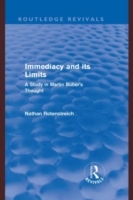Originally published in 1991, this book focuses on a major problem in the philosophy of Martin Buber. This is the topic of immediacy which is presented in terms of the contact between human beings on the one hand, and man and God on the other. The basic theme throughout is whether the I-Thou relation refers to immediate contact between human beings, as Buber saw it, or whether that relation is something established or aspired to. This is an important study which should be consulted in any future discussion of Martin Buber's thought. At the same time, it raises critical issues for recent European philosophy. Students of philosophy, and religious and social thought will find its critical exposition extremely helpful.

